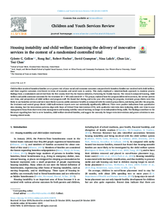Abstract
Child welfare-involved homeless families are at greater risk of poor social and economic outcomes compared with homeless families not involved with child welfare, and these negative outcomes reverberate in terms of economic and social costs to society. This study employed a mixed-methods approach to examine process findings from a randomized control trial from the first county-level Pay for Success initiative, Partnering for Family Success. The research compared housing, child welfare and public assistance outcomes for the treatment (N = 90) and control (N = 73) groups, explored how the program delivered its services, the service pattern over time, and perspectives of child welfare and program staff. We found that during and in the year after exiting the program, treatment group clients were less likely to use homeless services and were more likely to access public assistance benefits as compared with the control group clients, and during and after the program, the treatment and control group clients’ child maltreatment reports were not statistically significantly different. There were positive indications from quantitative data showing that the intervention patterns align with those of Critical Time Intervention (CTI), with qualitative interview data indicating shifts over time in case management focus from short-term crisis management and housing stability toward working on longer-term independent living skills. The findings contribute to the literature regarding how best to serve homeless, child welfare-involved families, and suggest the necessity for longer-term interventions and greater attention to non-housing-related needs.
View article here.

